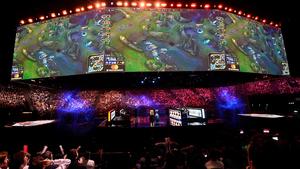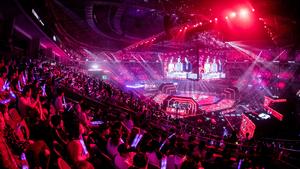Adopting a safety-first policy, League of Legends' finest return to thrill fans, as Shi Futian reports
 Team G2 Esports battle against FunPlus Phoenix during the first game of the League of Legends (LOL) World Championship Finals in Paris, France, Nov 10, 2019. (Photo / Agencies / CHINADAILY.COM.CN)
Team G2 Esports battle against FunPlus Phoenix during the first game of the League of Legends (LOL) World Championship Finals in Paris, France, Nov 10, 2019. (Photo / Agencies / CHINADAILY.COM.CN)
The coronavirus pandemic has forced sports leagues across the globe to hit the pause button, but thanks to online gaming e-sports is better equipped than most to keep the action going.
China's League of Legends Pro League (LPL) resumed its Spring Split and online live broadcasts of competitions on March 9 - a real boost for gaming fans who have been staying indoors for over a month due to the virus outbreak.
ALSO READ: 2020 LPL spring competition restarts online
The LPL Spring Split was originally scheduled to resume on Feb 5, before the epidemic took hold during Spring Festival and forced the league's temporary suspension.
The LPL Spring Split was originally scheduled to resume on Feb 5, before the epidemic took hold during Spring Festival and forced the league's temporary suspension
Perhaps not surprisingly, this month's restart witnessed a surge in viewers, with the live broadcast's first week recording an increase of over 30 percent in daily unique visitors (UV) compared with the same time last year.
Given the extraordinary circumstances, the resumption could only have happened thanks to a mammoth effort by organizers, who have made ensuring people's safety their top priority.
With players scattered across the globe during the Spring Festival vacation, the LPL has had to gather information on players' whereabouts, check their daily temperatures and assess their general physical and mental condition.
Players who returned to their clubs were all quarantined as a precaution before rejoining teammates, all the while strictly adhering to local coronavirus prevention policies in various cities.
Apart from requiring each club to conduct daily disinfection duties, the league made the wearing of masks compulsory at each team base, demanded regular body-temperature checks be conducted and enforced quarantine measures as per the national guidelines on intercity travel.
Some clubs employed even stricter measures. Royal Never Give Up (RNG), for example, allowed only trainers and match-supervision personnel to enter areas where players live, train or compete. The club's exhaustive safety procedures extend to all seven of its teams that compete in various leagues such as the LPL.
 More than 20,000 fans cheer games in the League of Legends Pro League, China's top professional league for LOL, at the Dalian Sports Center Stadium in Dalian, Liaoning province, where the Chinese league claimed the regional championship by defeating the league from South Korea 3-2 on July 8. (PHOTO PROVIDED TO CHINA DAILY)
More than 20,000 fans cheer games in the League of Legends Pro League, China's top professional league for LOL, at the Dalian Sports Center Stadium in Dalian, Liaoning province, where the Chinese league claimed the regional championship by defeating the league from South Korea 3-2 on July 8. (PHOTO PROVIDED TO CHINA DAILY)
"Since Spring Festival, RNG has collected information about all our members' health on a daily basis," RNG chairman Yao Jincheng told China Daily.
"We only allow players to return to the base after their quarantine. We also have to disinfect the players' rooms every day, while we test the body temperature of all our members before they enter the office. The club provides players and staff with masks and urges them to use hand sanitizer all the time."
In cooperation with its partner China Electronics Inno-Tech Co. Ltd (CEIT), RNG also donated medical protective clothing worth 300,000 yuan (US$42,000) to Xiaogan, a Hubei province city close to outbreak epicenter Wuhan.
"Working with RNG, we sent the protective clothing to Hubei to make our contribution to the fight against the virus. It's our social responsibility," said CEIT chairman Deng Xuang. "By staging online tournaments, the e-sports sector is making its own efforts to assist with the epidemic prevention."
Going online
E-sports tournaments are not just about competing in a virtual world. Under normal circumstances, fans attend LPL matches in their thousands to cheer on their favorite teams or gamers. The festival-like feel of these events is often enhanced by offline activities, such as meet-and-greets with star gamers. However, the coronavirus epidemic has made such gatherings impossible, and moving everything online is not as straightforward as one might imagine.
Maintaining a speedy and reliable internet connection, for instance, is absolutely crucial to maintaining match quality and a smooth live broadcast.
"We sent engineers and technical specialists to each club," said Leo Lin, the co-CEO of event organizer TJ Sports. "Cooperating with clubs, we had to make sure it's possible to conduct the tournament online from a technical level."
The LPL had been discussing the possibility of launching online competitions since February, when technical testing began. The league also staged test events at each club before the Spring Split restart, while the LPL's official technicians remain on standby in order to deal with any unexpected problems.
RNG chairman Yao told China Daily that the epidemic has had an inevitable impact on the club's offline marketing and fan activities, but added that the team has coped well with adjusting to the online competition format.
"Playing matches in the base, which the players are familiar with, allows them to have even better performances than when they travel to other venues. But it's still a shame for the players that they can't hear the deafening sound of cheering from the fans."
Another issue is ensuring the fairness of competitions. The league has dispatched judges and supervisors to most matches, however that hasn't been possible at all clubs due to the different epidemic prevention policies in place in various cities. So far, the solution has been the installation of cameras to allow the league to monitor competitions remotely. The LPL says any club deemed not to have cooperated fully with supervision regulations will be severely reprimanded.
The return of the LPL Spring Split is supported by the Shanghai local government. The city is positioning itself as a "global e-sports center" and is due to host the 2020 League of Legends World Championship (S10) - the competition's largest and most prestigious global event.
READ MORE: Bilibili inks three-year contract to broadcast LoL in China
"Shanghai boasts 80 percent of China's e-sports enterprises, professional clubs and live broadcast platforms, while 40 percent of national e-sports events choose Shanghai as their host city," said Wang Yayuan, the deputy director of Shanghai municipal publicity department.
"During the epidemic over 400 offline e-sports competitions have been affected, and the Shanghai government has taken a series of measures… Shanghai municipal government encourages e-sports enterprises to host their offline matches in an online way. For those companies that have been severely affected by the epidemic, local authorities will provide funding as a priority."


